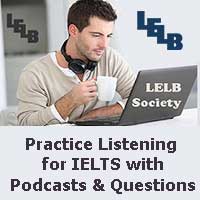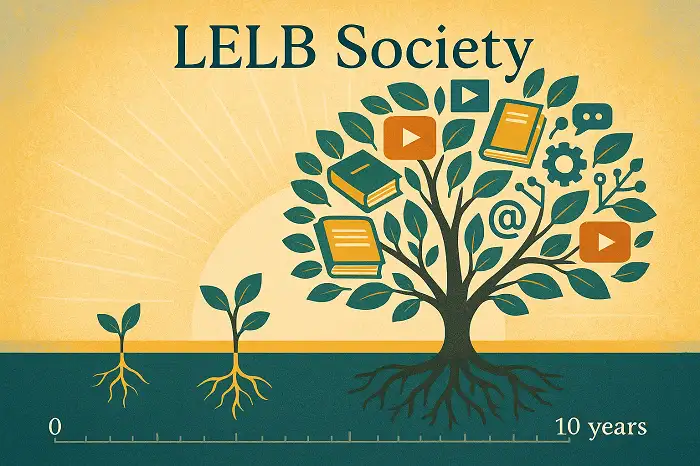IELTS Listening Practice | Post Traumatic Stress Disorder IELTS Listening Practice | Post Traumatic Stress Disorder About this activity This activity is labeled round table by Dr. Hariri, the creator and administrator of LELB Society. This activity is on the premise of Flipped Learning, according to which the students watch a video before the class, carry out research into the selected theme, and prepare themselves for an informed discussion in the class. This is a weekly activity, that is, one post with one embedded video for two sessions per week. In this flipped classroom activity, the students are encouraged to utilize ...
Home » Listening Practice in English » IELTS Listening Practice | Post Traumatic Stress Disorder

IELTS Listening Practice | Post Traumatic Stress Disorder
Updated: by Dr. Mohammad Hossein Hariri Asl
Time to Read: 3 minutes | 396 Views | 25 Comments on IELTS Listening Practice | Post Traumatic Stress Disorder
Share This Post
About the Author
Dr. Mohammad Hossein Hariri Asl is an English and Persian instructor, educator, researcher, inventor, published author, blogger, SEO expert, website developer, entrepreneur, and the creator of LELB Society. He's got a PhD in TEFL (Teaching English as a Foreign Language).
Number of Posts: 4243



one thing that is very important to me is that doctor is very honest .In one part of his speech he said that a man cam in to my office and he had a bad accident and I told that o my God there is nothing that I can do for him. It shows that he is very serious in his profession. I admire him.
Great comment, thank you!
It shows that you paid special attention to the details. Please keep on doing that.
I recommend you pay more attention to the form of your English. Apart from your brilliant message, in your lines, there are some punctuation and capitalization problems.
This is just a simple recommendation.
Which group of people are more susceptible to PTSD?
Post Traumatic Stress Disorder (PTSD) is an anxiety disorder that can develop after experiencing or witnessing a traumatic event, or learn that a traumatic event has happened to a loved one. Based on studies, approximately 4% of youth aged 13-18 will develop PTSD in adolescence. Girls are more likely than boys to develop PTSD and to experience symptoms for a longer duration. In addition, I would like to mention some signs and symptoms below.
– It’s my fault it happened
– All men are dangerous
– I need to stay alert at all times to protect myself
– I deserved it; I’m a bad kid
So elaborate, thanks a lot!
As you said, extreme sensitivity to our surroundings might cause Hypervigilance, which per se can cause sleep paralysis.
You’re most welcome. Thank you so much. Unfortunately, I did not get what you mean by “per se”.
It’s my pleasure.
Thanks for asking. “Per se” means “by itself”.
Thank you so much.
Anytime. It’s my pleasure.
Note
This is the last session on this subject. Next week (from Saturday), we will be focusing on another lecture on a different topic.
Let’s respond to this comment to come up with some practical solutions to the problem of PTSD.
Practicing mindfulness and meditation can help minimize hyperactivity in the amygdalae in PTSD patients.
When the source of threat and trauma has been removed, go back and expose yourself to the threatening causes of trauma, e.g. places or people, to convince yourself that they are no more threatening.
In the body of traumatized people, the adrenaline automatically soars rapidly in the face of fear and it declines so late when the source of fear is removed.
Traumatized people are generally captured in the past. They have an acute sense of shame that sabotages their relationship with other people.
Do you know any trauma therapist? I suppose many people are coping with traumas these days but they do not believe in these methods. How can we internalize these methods?
Excellent question, thank you.
Most of people experience trauma during their lives. Car accidents, a sudden death of a loved one, and wars, for example. Some people bounce back with resilience under the influence of family members. However, some cannot heal from trauma easily, dealing with distress, fear, depression and so on. As a result, trauma therapists take advantage of different methods to help the victims;
Group Therapy, Psychodynamic Therapy, Eye Movement Desensitization and Reprocessing (EMDR), Behavior Therapy (exposure therapy is one example of behavior therapy which is really influential for decreasing post traumatic stress.), etc.
Excellent!
For each problem, there must be at least one solution, and this is an integral part of the definition of the word, problem.
Traumatized people often find it impossible to seek practical solutions to their temporary problems. They desperately need guidance and assistance at the climax of their life crises. For this reason, we should help them to re-find themselves and get back on track.
Thank you so much for this video.
My view is that delivering a lecture perfectly not only needs a great performance but also enough knowledge. So, I think the performance of Dr. Bessel van der Kolk is not that dynamic though he is a well known person in the field of trauma therapy. Also, he is speaking monotonously, making audience bored. Nevertheless, his body language is something which adds color to his lecture.
Great points.
Actually, he is so famous that he doesn’t feel obliged to bother about the form of his presentations.
? Do not just wait for me to feed you with questions. We are here to make a difference.
Dr. Bessel van der Kolk’s best-selling book: The Body Keeps the Score – Brain, Mind, and Body in the Healing of Trauma
EMDR stands for Eye Movement Desensitization and Reprocessing.